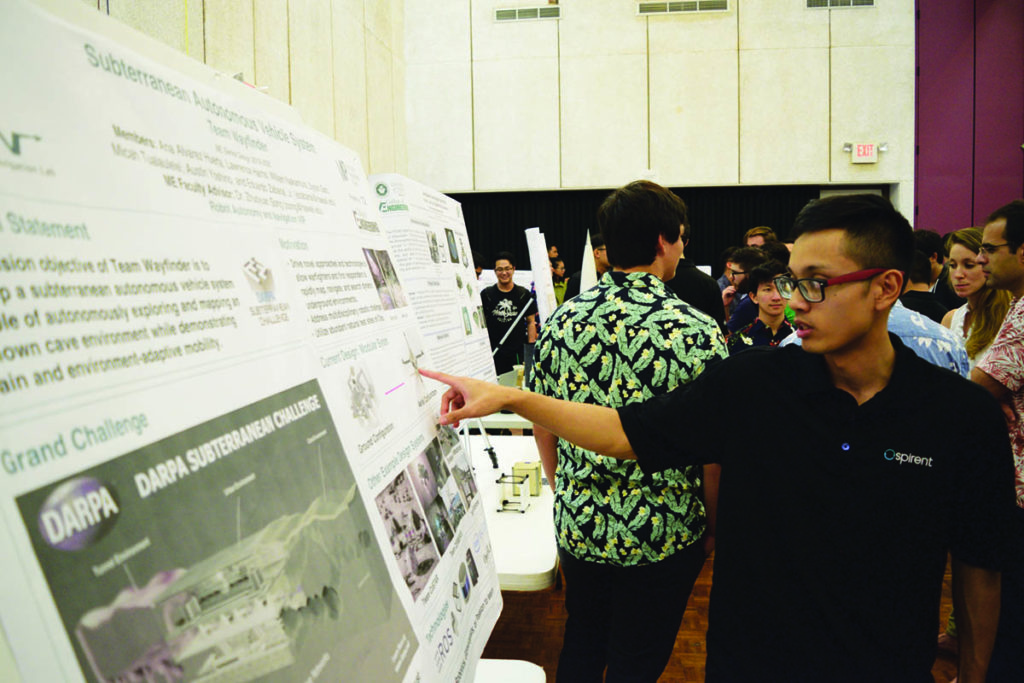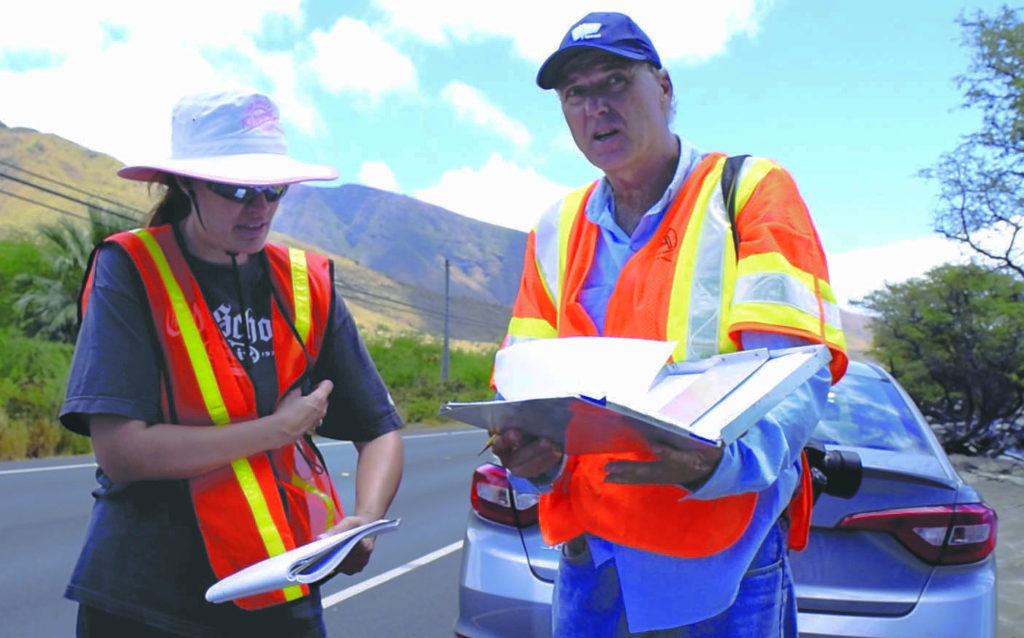FOR MANY DECADES, LOCAL INDUSTRY LEADERS HAVE VALUED and sought out the expertise of the University of Hawai‘i at Mānoa (UH Mānoa) College of Engineering on a multitude of important matters ranging from education to infrastructure, workforce development, and even finance. Now, with the onslaught of climate change issues and a rapidly approaching deadline to one of the country’s most aggressive clean energy mandates, these industries and organizations are again calling on the college to assist with critical issues that will help to ensure a more sustainable and resilient future in Hawai‘i.
“The University of Hawai‘i at Mānoa’s College of Engineering has always enjoyed a great working relationship with our local industry partners that is based on a mutual exchange of ideas, talent and responsible stewardship,” said UH Vice President for Research and Innovation Vassilis L. Syrmos. “Today, this valued industry partnership has become even more important as the state, the nation and the world require engineering-based solutions to mitigate the ever-increasing challenges brought about by climate change.”
Syrmos’ statement is validated by a recent anonymous donation of $2 million to UH Mānoa to study resiliency. The donation continues and advances the work of the late Alfred A. Yee, a world-renowned local engineer whose passion was finding a way to provide clean, cost-effective sources of energy to small island communities. The gift provides ongoing funding to recruit and retain outstanding faculty with expertise in sustainability and resilience, fueling competitive research, engineering-sector resiliency solutions and teaching in these critical areas.

Brennon Morioka, dean of the UH Mānoa College of Engineering, views this contribution as a “vote of confidence” by the local community that the University of Hawai‘i can and should lead on many fronts related to the challenges Hawai‘i faces.
The sentiment is echoed by Ken Hayashida, founder of the Honolulu-based structural and forensic engineering firm KAI Hawai‘i. “The University of Hawai‘i is key to providing us with young people who are committed to change our community for the better,” said Hayashida. “That’s going to require all of us to invest in our university so we have young people who can lead, innovate and provide us a safe, sustainable and resilient community to live in.”
Recognizing the UH Mānoa College of Engineering’s contributions to his industry and Hawai‘i at large, KAI Hawai‘i has given $250,000 to the college to endow a new Vertically Integrated Project (VIP) related to sustainability and resilience. VIP projects are long-term research projects made up of undergraduate students who work under the supervision of faculty and graduate students. This program gives undergraduates the rare experience of conducting research in engineering with the intention that they will use the innovative out-of-the-box thinking skills they learned when they graduate and enter the industry.
The goals of this new VIP project are to help support broad UH energy and sustainability efforts, including becoming net-zero energy by 2035 and carbon neutral by 2050. Specifically, the team will be working on:
- PV system battery performance verification on the campuses of UH Maui College, Leeward Community College, and Windward Community College.
- UH metering data analysis: individual building energy consumption is to be correlated with weather patterns to detect anomalies and help reduce overall energy consumption.
- Occupancy monitoring and HVAC data analysis of UH Mānoa’s Sakamaki Hall will be obtained using Doppler radar-based sensors to provide a baseline for more efficient HVAC scheduling.
- Data analysis to study the correlations of indoor and outdoor environmental parameters with occupancy patterns and energy use in Flexible Response to Ongoing Growth (FROG) buildings.

While those programs have not commenced yet, a team of UH Mānoa College of Engineering faculty has already begun to help to improve the lives of Hawai‘i residents. In 2019, a team of UH engineering professors led by Oceana Francis and the late Horst Brandes produced a Statewide Coastal Highway Program Report for the State Department of Transportation’s Highways Division. Using a new approach, the team ranked the twenty most vulnerable locations in Hawai’i for purposes of road management and planning.
“The results show that the methodology proves useful and promising for government-, state-, and county-level road authorities and agencies in the assessment of the coastal road erosion problems and their decision making with regard to remediation measures,” said Francis. “I also bring these projects into my classroom where the students get to learn about these projects and the tools to do the work.”
The private sector has also taken notice of the UH Mānoa’s College of Engineering’s potential for solving Hawai‘i’s challenges.
First Insurance Company of Hawai’i (FICOH) has expressed an interest in working with the college to better anticipate longer-term risk management for aging buildings and thereby helping to control the cost of housing for Hawai‘i’s residents.
“As Hawai‘i’s condos age, they become more susceptible to devastating water and fire losses,” said Drew Nagai, assistant vice president of Risk and Safety Management at FICOH. “Working with our academic partners at the UH Mānoa College of Engineering, our goal is to use our shared knowledge to make maintenance recommendations to the condominium associations (AOAOs) that will help to decrease the frequency and severity of condo losses, improve access to insurance, and make Hawai‘i a more affordable place to live for future generations.”
Morioka appreciates this support and points out that Hawai’i’s reliance on the UH Mānoa College of Engineering is nothing new nor is it likely to end any time soon.
“Hawai‘i’s public and private sectors have been rallying around the UH Mānoa College of Engineering, from hiring our graduates for employment to fill the growing demands of an engineering workforce in Hawai‘i to working with our faculty and students on solving real-world problems our government agencies and private sector partners are facing today that require immediate solutions,” said Morioka. “Our college has become the go-to resource for many things from sustainability and resilience issues, helping Hawai‘i achieve its renewable energy goals, researching 5G and broadband communication capabilities, advancing autonomous vehicle technologies, partnering in clinical research for biomedical innovation, cyber security and new digital infrastructure, aerospace, and space exploration, and even astronomy — working in the observatories right here at home.”

